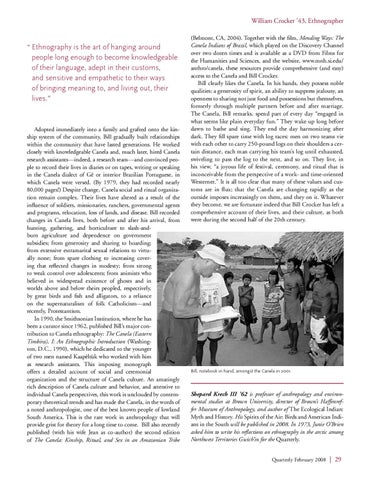William Crocker ’43, Ethnographer
“ Ethnography is the art of hanging around people long enough to become knowledgeable of their language, adept in their customs, and sensitive and empathetic to their ways of bringing meaning to, and living out, their lives.”
Adopted immediately into a family and grafted onto the kinship system of the community, Bill gradually built relationships within the community that have lasted generations. He worked closely with knowledgeable Canela and, much later, hired Canela research assistants—indeed, a research team—and convinced people to record their lives in diaries or on tapes, writing or speaking in the Canela dialect of Gê or interior Brazilian Portuguese, in which Canela were versed. (By 1979, they had recorded nearly 80,000 pages!) Despite change, Canela social and ritual organization remain complex. Their lives have altered as a result of the influence of soldiers, missionaries, ranchers, governmental agents and programs, relocation, loss of lands, and disease. Bill recorded changes in Canela lives, both before and after his arrival, from hunting, gathering, and horticulture to slash-andburn agriculture and dependence on government subsidies; from generosity and sharing to hoarding; from extensive extramarital sexual relations to virtually none; from spare clothing to increasing covering that reflected changes in modesty; from strong to weak control over adolescents; from animists who believed in widespread existence of ghosts and in worlds above and below theirs peopled, respectively, by great birds and fish and alligators, to a reliance on the supernaturalism of folk Catholicism—and recently, Protestantism. In 1990, the Smithsonian Institution, where he has been a curator since 1962, published Bill’s major contribution to Canela ethnography: The Canela (Eastern Timbira), I: An Ethnographic Introduction (Washington, D.C., 1990), which he dedicated to the younger of two men named Kaapêltùk who worked with him as research assistants. This imposing monograph offers a detailed account of social and ceremonial organization and the structure of Canela culture. An amazingly rich description of Canela culture and behavior, and attentive to individual Canela perspectives, this work is unclouded by contemporary theoretical trends and has made the Canela, in the words of a noted anthropologist, one of the best known people of lowland South America. This is the rare work in anthropology that will provide grist for theory for a long time to come. Bill also recently published (with his wife Jean as co-author) the second edition of The Canela: Kinship, Ritual, and Sex in an Amazonian Tribe
(Belmont, CA, 2004). Together with the film, Mending Ways: The Canela Indians of Brazil, which played on the Discovery Channel over two dozen times and is available as a DVD from Films for the Humanities and Sciences, and the website, www.mnh.si.edu/ anthro/canela, these resources provide comprehensive (and easy) access to the Canela and Bill Crocker. Bill clearly likes the Canela. In his hands, they possess noble qualities: a generosity of spirit, an ability to suppress jealousy, an openness to sharing not just food and possessions but themselves, formerly through multiple partners before and after marriage. The Canela, Bill remarks, spend part of every day “engaged in what seems like plain everyday fun.” They wake up long before dawn to bathe and sing. They end the day harmonizing after dark. They fill spare time with log races: men on two teams vie with each other to carry 250-pound logs on their shoulders a certain distance, each man carrying his team’s log until exhausted, swiveling to pass the log to the next, and so on. They live, in his view, “a joyous life of festival, ceremony, and ritual that is inconceivable from the perspective of a work- and time-oriented Westerner.” It is all too clear that many of these values and customs are in flux; that the Canela are changing rapidly as the outside imposes increasingly on them, and they on it. Whatever they become, we are fortunate indeed that Bill Crocker has left a comprehensive account of their lives, and their culture, as both were during the second half of the 20th century.
Bill, notebook in hand, amongst the Canela in 2001.
Shepard Krech III ’62 is professor of anthropology and environmental studies at Brown University, director of Brown’s Haffenreffer Museum of Anthropology, and author of The Ecological Indian: Myth and History. His Spirits of the Air: Birds and American Indians in the South will be published in 2008. In 1973, Junie O’Brien asked him to write his reflections on ethnography in the arctic among Northwest Territories Gwich’in for the Quarterly. Quarterly February 2008
| 29
